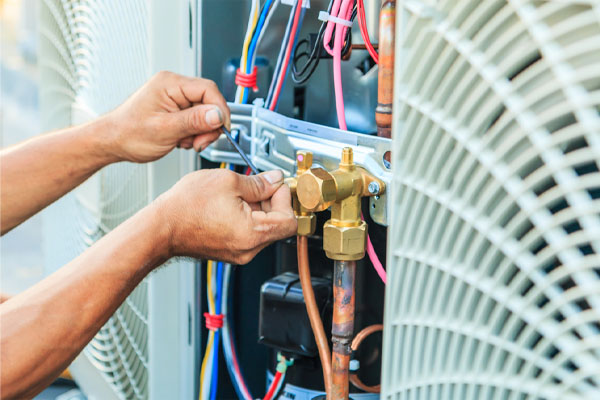
Air conditioners are fast-evolving machines as advances in HVAC technology have made it possible for them to be more energy-efficient than before. Standard units are quickly being replaced by variable-speed or modulating air conditioner models. This AC offers stable performance and excellent energy consumption, among others. They are built with features like effective temperature control and humidity reduction for better home comfort.
Read on to find out more about this type of air conditioning system.
Standard Units vs. Modulating Air Conditioners
Modulating technology is best understood and appreciated when compared to standard systems. Traditional or standard air conditioners have fixed-speed compressors. This means that it operates at 100& capacity when you switch on your air conditioner and completely shuts down when it turns off.
It might not seem like an issue, but a standard air conditioner consumes a lot of power because of this. Each cycle starts from scratch, so it needs plenty of energy, resulting in high utility bills. Moreover, cooling temperatures aren’t flexible because of their fixed-speed operation. The airflow is typically extreme and intense. You may also experience cold or hot spots around your home.
How Is A Modulating Air Conditioner Different?

On the other hand, a modulating unit does not run at 100% capacity at all times. It can be modified to operate somewhere between 40% and120%. This way, there are even and less extreme temperatures around your home. The balanced temperatures throughout will allow improved comfort and increased airflow quality.
Modulating air conditioners have variable speed compressors. It can modify or adjust the speed to ensure your various heating and cooling needs are met. When the system’s output is controlled, the amount of power it uses is also controlled.
Fixed vs. Flexible Temperature Control
We often hear the phrase “blast the AC” because this is how standard systems work. Switching it on means that it blows conditioned air at full speed. The temperature can only be either hot or cold. Aside from the limited temperature settings, it typically has a too-strong airflow, but some areas do not receive adequate heating or cooling. This results in cold or hot spots that make your home uncomfortable.
A modulating HVAC system solves these issues with adjustable settings. It offers variable speed so you can adjust the airflow according to your home’s needs and specifications. As a result, the
AC’s output is less intense, and your home does not experience extreme temperatures nor hot and cold spots. This type of air conditioner also allows consistent and steady airflow around your home. It is customizable to your desired temperature so you can achieve the cooling your family wants.
Keep in mind that airflow quality can be affected by other factors as well. A modulating air conditioner will have optimal functionality if it is installed as per your home’s specifications. Consult a professional HVAC technician to learn more about this.
High vs. Low Humidity

Standard air conditioning systems cycle on and off frequently. During each cycle, the unit might not have enough time to dehumidify the air. Therefore, you will have higher humidity levels in your home. It then comes to no surprise that your traditional unit can leave your home feeling uncomfortable and sticky. Moreover, a high amount of moisture in the air encourages the growth of mold and other pathogens. These can wreak havoc on your home and negatively affect your health and well-being.
On the other hand, modulating or variable speed ACs are built to stop the growth of mold. It has fewer cycles so that it can dehumidify your home more effectively. You can even set the temperature higher without worrying about mold or feeling clammy inside your home. Since modulating systems run longer, they can also better filter indoor air pollutants. This means that you will have healthier indoor air quality at home.
Most modulating units do not let the humidity level in your home get past 50%. HVAC professionals recommend this. However, a standard air conditioner allows humidity to exceed 60%, encouraging mold to breed in your home. Therefore, these units should be eventually replaced. Proper and regular maintenance can avoid this problem entirely.
Modulating air conditioning units are not made equal. There is no guarantee that one model will reduce the humidity automatically. It is recommended that you consult an HVAC specialist to make informed decisions about what will best work for your home’s needs and specifications.
Set vs. Smart Energy Consumption

A standard air conditioner means that it is likely consuming high amounts of power. This might be especially true during the hot summer months. As a result, homeowners often look for other means to cut energy costs. This includes adding extra insulation or finding ways to boost airflow inside their homes. However, if you have traditional air conditioners, there is no escaping high energy costs except to use your cooling system less, which is not a cost-effective option.
Fortunately, modulating air conditioning systems were designed to be highly efficient. Its variable speed feature means it can operate with varying outputs. If it is functioning at 40% capacity, it will not use the same amount of energy if it were running at 100%. It allows you to control how much power it uses as well as keep it turned on at all times without consuming a lot of energy.
Maintenance Costs vs. Short Payback
Modulating air conditioners is a worthy investment that allows you to save on energy costs. It will also eventually pay dividends, including the installation and maintenance. These units also have a relatively short payback time.
With standard units, you can cut on its maintenance costs, but it will still cost you more as time passes. Fixed speed models are under more pressure and strain than variable speed units. A consistently strained unit likely needs more HVAC repairs and replacements.
Conclusion
Energy efficiency is a feature that most homeowners look for. Therefore, transitioning from standard units to modulating air conditioners is inevitable. Inverter technology innovations offer more cost-effective heating and cooling. Additionally, variable-speed designs have effective temperature and humidity controls, so you have an eco-friendlier, smarter, and more comfortable home.
Call Point Bay Fuel For All Of Your HVAC Requirements

Point Bay Fuel provides high-quality heating and cooling services in Ocean and Monmouth County, New Jersey. Rest assured, our professionally certified technicians can conduct all your HVAC services needs, such as air conditioning repairs, furnace maintenance, boiler installations, and more. All our friendly techs have years of experience and extensive knowledge to correctly service any HVAC make and model.
Do not hesitate to call Point Bay Fuel for the most competitive HVAC service rates in the area. We can improve your comfort, enhance your energy efficiency, and reduce your energy costs with our tune-up services. We can also recommend the best repair or replacement solutions while staying within your budget. Schedule a service appointment with Point Bay Fuel today. We offer in-home estimates.
Contact us now by calling (732) 349-5059 to speak to one of our home comfort specialists!
The post Modulating Air Conditioner: Effective Temperature & Humidity Control appeared first on Point Bay Fuel.
No comments:
Post a Comment